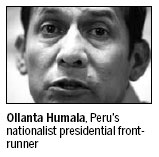Politics
Presidential candidate wants stability in Peru
Updated: 2011-04-15 07:35
By Teresa Cespedes and Terry Wade (China Daily)
|
|
LIMA, Peru - Nationalist presidential front-runner Ollanta Humala wants economic stability for Peru if elected in June and will not follow the path of leftist leaders in Venezuela and Bolivia, his top adviser said on Wednesday.
Peru's benchmark stock index sank 6.2 percent and its sol currency weakened further on worries about Humala's first-round win on Sunday.
A former army officer turned populist, Humala will face lawmaker Keiko Fujimori in a run-off election on June 5.
"This has nothing to do with (Venezuelan President Hugo Chavez), nothing to do with Bolivia," Humala's economic adviser, Felix Jimenez, said. "Economic stability is very important for consolidating growth."
Humala, who says wealth from a decade-long boom has failed to benefit a third of Peruvians living in poverty, moved to the center after narrowly losing the 2006 race and tries to emulate Brazil's moderate former president Luiz Inacio Lula da Silva.
A professor at Lima's Catholic University and a former director in the Finance Ministry's debt department, Jimenez said Humala has categorically ruled out taking over private companies - unlike Chavez and Bolivian President Evo Morales, who have taken over banks and oil firms.
"There's not going to be anything like state takeovers or expropriations," Jimenez said.
He did, however, say Humala favors renegotiating some contracts held by mining and natural gas firms, so they would pay more taxes to the government and, in the case of gas, give priority to domestic consumers over exports.
Many miners have what amount to special tax treaties with the government, which gives them preferential treatment and protects them from tax hikes, though most of the pacts were signed in the 1990s and will start expiring next year.
Jimenez got his doctorate in economics at the New School in New York, which says on its website it teaches "a wide range of schools of thought, including Keynesian and post-Keynesian economics" alongside neoclassical economics.
In an interview, Jimenez appeared to endorse part of a set of policies that are sometimes called "resource nationalism".
"Nationalization is a type of political proposal that means that extractive industries should work toward national development," he said. "The exploitation of non-renewable natural resources should serve the country so we can develop."
Firms in Peru's vast resources sector should pay royalties and windfall profits taxes, plus existing levies, he said. Any changes could potentially impact global giants like Southern Copper, Xstrata and Newmont.
Right now, Peru's tax take is merely 15 percent of gross domestic product, leaving the state relatively weak and unable to finance education and healthcare programs.
Jimenez said a broad tax reform that shifts the burden to big natural resource companies and away from consumers could gradually lift tax revenues to 20 percent of GDP.
"The state needs (financial) resources," he said.
Humala's tax reform plan would trim the sales tax, keep income taxes stable and raise taxes on mining and oil firms.
"This depends on Congress, where we will negotiate because we don't have a majority," Jimenez said.
Better public services in provinces could also help defuse lingering social tensions, Jimenez said.
More than 100 towns in Peru have organized to halt mining and oil projects on fears they will take scarce water supplies or cause pollution. That has jeopardized up to $40 billion in planned projects, former finance ministers say.
Reuters
Specials

Share your China stories!
Foreign readers are invited to share your China stories.

Art auctions
China accounted for 33% of global fine art sales.

Waiting for drivers' seat
Lack of sponsorship appears to be why Chinese drivers have yet to race in a Formula 1 event
